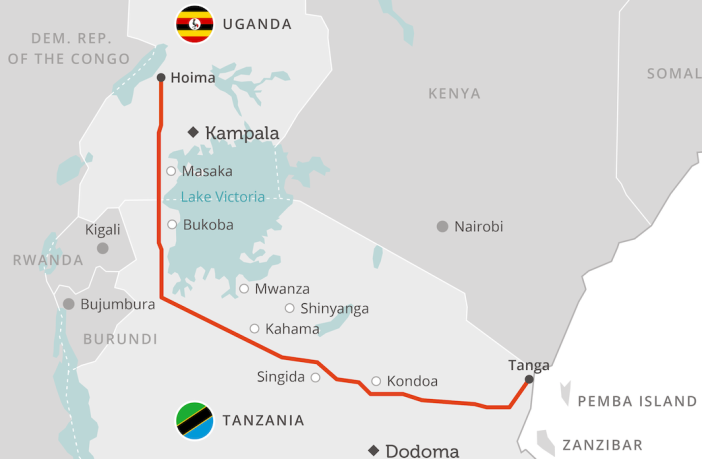- The East African Court of Justice (EACJ) has reserved judgment after hearing arguments for and against the objection to the court’s jurisdiction filed by the Secretary General of the East African Community, the Republic of Tanzania and Republic of Uganda in response to the case challenging the construction of the East African Crude Oil Pipeline (EACOP) until the questions of environmental, social justice, and climate justice concerns raised in the case are heard and determined.
The matter was coming up for highlighting submissions for the preliminary objection filed by the Respondents: The Republic of Uganda, the Republic of Tanzania, and the Secretary-General to the East African Community.
In February 2022, the Lake Albert Development Project partners announced the final investment decision and the launch of this major project representing a total investment of approximately US$10 billion. The development encompasses the Tilenga and Kingfisher upstream oil projects in Uganda and the construction of the East African Crude Oil Pipeline (EACOP) in Uganda and Tanzania. The Tilenga project, operated by TotalEnergies, and the Kingfisher project, operated by CNOOC, are expected to start producing in 2025 and to reach a cumulative plateau production of 230,000 barrels per day. The upstream partners are TotalEnergies (56.67%), CNOOC (28.33%) and UNOC (15%). Production from the oil fields in Uganda will be transported to the port of Tanga in Tanzania through the EACOP cross-border pipeline, whose shareholders are TotalEnergies (62%), UNOC (15%), TPDC (15%) and CNOOC (8%).
The preliminary objection sought to dismiss the case before the Applicants got the opportunity to ventilate the real issues at the main hearing. The Respondents’ contention was threefold: One, that the court did not have the power to entertain the case since it was brought outside the statutory period of two months. Secondly, they contested the jurisdiction of the court to entertain issues of violation of human rights- according to the Respondents, this matter fell outside the court’s purview when human rights issues arose. Finally, the Respondents argued that the matter was not ripe for hearing due to the Applicants’ submission being defective.
The Applicants – Natural Justice, Centre for Strategic Litigation, the Centre for Food and Adequate Living Rights (CEFROHT) Limited, and Africa Institute for Energy Governance (AFIEGO) – asked the court to dismiss this preliminary objection on the basis that it was not properly framed. The nature of the objection raised by the Respondents is argued on points of law only. The Applicants argued that the issues raised by the Respondents required the court to go into questions of fact, which the court should not consider at a preliminary stage. Specifically, the court could not, at this point, evaluate the contested dates on which The Intergovernmental Agreement and the Host Government Agreement were signed.
On the issue of the submissions being defective, the Applicants argued that court rules did not provide for a specific format for the verification of documents, as such the mode they adopted was sufficient, and in any case, the Respondents had not shown that they were put to any disadvantage by how the Applicants had verified their submission.
Ruling on the preliminary objection will likely be handed down when the court sits again in June or August 2023. If the preliminary objection on the court’s jurisdiction is successful, the case shall be dismissed, and if the court determines that it has jurisdiction, then the matter shall proceed, and will be heard on merits.
“The importance of this case for biodiversity and millions who stand to be impacted by it remains, making it all the more important that it be considered on its merits. We hope that this will be among the watershed cases that take up and address important issues of development, climate change and its human rights impacts, ” said Mark Odaga, Attorney, Natural Justice.
Background
On 6 November, 2020, Natural Justice, Centre for Strategic Litigation, the Centre for Food and Adequate Living Rights (CEFROHT) Limited, and Africa Institute for Energy Governance (AFIEGO) filed a case against the governments of Uganda and Tanzania and the Secretary General of the East African Community (EAC), challenging the construction of the EACOP at the EACJ. The applicants also applied for a temporary injunction to stop the construction of the EACOP until the questions of environmental, social justice, and climate justice concerns raised in the case are heard and determined. This application is yet to be determined by the Court.
The Applicants’ case is premised on grounds that the EACOP project contravenes various provisions of the the treaty of the East African Community; the Protocol for the Sustainable Management of the Lake Victoria Basin; the African Charter on Human and People’s Rights; the African Convention on Conservation of Natural Resources; the post-2020 Convention on Biological Diversity and the Paris Climate Accords. Moreover the applicants contend that the project proponents, including French oil giant Total Energies, China’s National Offshore Oil Corporation, and the states of Uganda and Tanzania did not conduct effective and meaningful public participation and consultation, and neither did they conduct both human rights and climate impact assessments before the commencement of the EACOP project.
Author: Bryan Groenendaal















